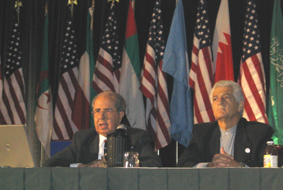Rounding off this year’s Silver Anniversary Convention was a panel entitled "Prospects For Peace In Palestine”, featuring Palestinian intellectual Salman Abu Sitta as the main speaker. The presentation with its meticulous charts and statistics conveyed quite effectively the magnitude by which Palestinians aspire to achieve statehood and self-determination. SalmanAbu Sitta articulated the roots of the conflict and the difficulties that must be overcome in order to create a lasting peace between Palestinians and Israeli's.
 Salman Abu Sitta discusses the right of return in the Prospects for Peace in Palestine panel
Salman Abu Sitta discusses the right of return in the Prospects for Peace in Palestine panel
In order to achieve a comprehensive understanding of the Palestinian-Israeli conflict, SalmanAbu Sitta asserted that one must look beyond the last 50 years of the conflict. As violence between both Palestinians and Israeli's has escalated since the inception of the Palestinian Intifada or uprising, much discussion has ensued regarding the feasibility of both parties living in peace with each other. Salman Abu Sitta pointed out that Arabs and Jews have been living in peace with each other for centuries before the birth of the state of Israel in 1948. He aimed to dispel the commonly held notion that both people could not coexist. The unfortunate reality, Salman Abu Sitta stated, was that, "Israel has historically attempted to demonize the Palestinian Arabs in order to establish legitimacy within their claims that the Palestinians are uncompromising and unwilling to make peace". He added, "This is done so that Israel may have a free hand in deciding the outcome of the conflict and implement its own resolution all the while eliminating the art of compromise".
Salman Abu Sitta insisted that Palestinian attempts to re-assert their rights to ownership of confiscated land haven’t succeeded despite the obvious legitimacy of the claims. He said, "Despite reoccurring conflict in 1948, 1967, and 1973 which has resulted in over six million Palestinian refugees, 78% of those refugees live within 100 km of their original homes. About half of those refugees live within 50 km of their original homes. This is truly astonishing consider this is uncharacteristic of the general trend amongst refugees who are forcibly removed from their homes or who leave under extenuating circumstances".
Despite historical realities, Salman Abu Sitta emphasized the importance of focusing on the present situation in order to establish a viable and lasting peace in the Middle East. The most salient and contentious issues regarding this conflict, those issues that are so imperative to creating a lasting peace, are the very issues that Israel refuses to address, according to Salman Abu Sitta. One of the most important issues, he asserted, is the status of refugees and the right of return.
Salman Abu Sitta's lecture on the potential for peace in Palestine above all shed light on the resilience that the Palestinian's have shown in their desire to realize freedom and autonomy. If peace is to be established, it necessitates genuine self-criticism on the part of both parties, as well as an attempt to transcend the self in order to secure a peaceful future.
By Yazen Fakhouri